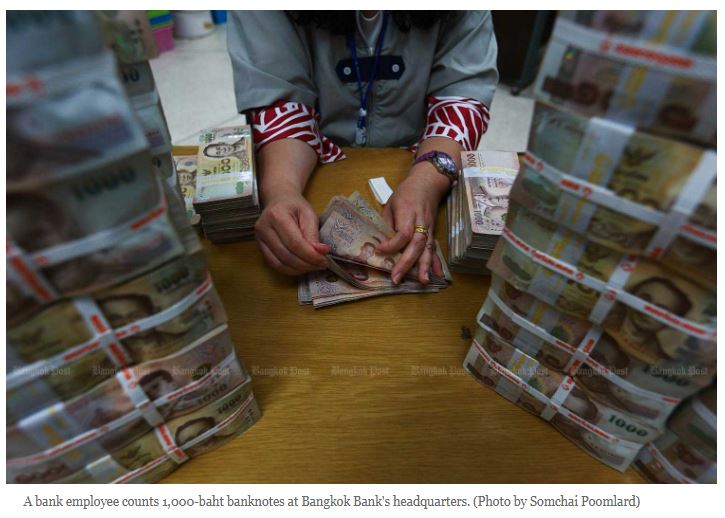Thailand: BoT wary of strong baht damaging trade
The Bank of Thailand is still concerned the baht’s gain relative to trading partners’ currencies could affect the economy to a larger degree amid intensifying trade tensions, according to minutes of the rate-setting committee meeting on Aug 7.
The committee believes financial markets will remain highly uncertain going forward because of various factors including prolonged trade tensions that could intensify and broaden to other countries, increased likelihood of a no-deal Brexit, and the monetary policy stance of advanced economy central banks, especially the Federal Reserve and the European Central Bank, which could lead to more volatile asset prices and exchange rates.
Sustained exchange rate appreciation might result in greater effects on exports amid the slowdown in trading partner economies and heightened international competition, the minutes said.
Signs of impacts on profits, debt serviceability and overtime employment cuts began to be seen in some export-related sectors.
If these impacts were broadened to other sectors, the purchasing power of households related to export firms and overall economic growth could be affected, it said.
“Thai assets are supported by sound external fundamentals and Thailand had low exposure to the adverse impacts of trade protectionism compared with other countries. These factors could continue to pressure the baht in the period ahead,” it said.
“The committee will closely monitor developments of exchange rates and capital flows as well as assess the need of additional appropriate measures.”
The central bank has implemented some measures to rein in the baht’s rapid gain.
Such measures included tapering of short-term bond supply, a cap on the outstanding balance of non-resident accounts from 300 million baht per person to 200 million, and a reporting requirement for the names of end beneficiaries for all non-residents’ holdings of Thai debt securities.
The baht is the top-performing currency in Asia, up 5-6% against the greenback year-to-date.
The strength of the baht was also cited as a factor that prompted the rate-setters to make a surprise cut of the benchmark rate by a quarter-percentage point to 1.50% on Aug 7 on a 5-2 vote.
“Most committee members believed a more accommodative monetary policy would promote economic growth and the return of headline inflation to its target in the context of heightened uncertainties, mainly from external factors,” said the minutes.
Anxiety on household debt
The committee also voiced concerns about high and rising household leverage as a result of loan expansion by commercial banks and non-bank financial institutions.
In particular, more relaxed personal loan underwriting standards could encourage households to increase vulnerabilities.
The share of households sensitive to negative income shocks had increased, which could weigh on household debt serviceability.
Therefore, the channels through which negative income shocks could affect such households during an economic slowdown and drought conditions should be closely monitored, said the minutes.
The committee will also monitor worsening debt serviceability of small and medium-sized enterprises, as indicated by elevated non-performing loans and the rising trend of special mention loans amid the economic slowdown.
Thailand was among the top three nations with the largest household debt in Asia. Thailand’s family debt load was 78.7% of GDP at the end of March, rising from 53.5% in 2009.
Growth below potential
The Thai economy was expected to expand at a slower pace than previously assessed and below potential, given the higher than expected slump in exports and the slowdown in the tourism sector.
The impact of the merchandise export slowdown on domestic demand can be seen, said the minutes, noting that private consumption and investment would decelerate because of weakening household and business confidence, ebbing non-farm income and employment in export manufacturing sectors, declining farm income that is partly affected by drought, and lower household purchasing power because of elevated household debt.
The central bank is scheduled to review its 2019 economic growth forecast of 3.3% next month.
Source: https://www.bangkokpost.com/business/1734635/bot-wary-of-strong-baht-damaging-trade


 Thailand
Thailand




